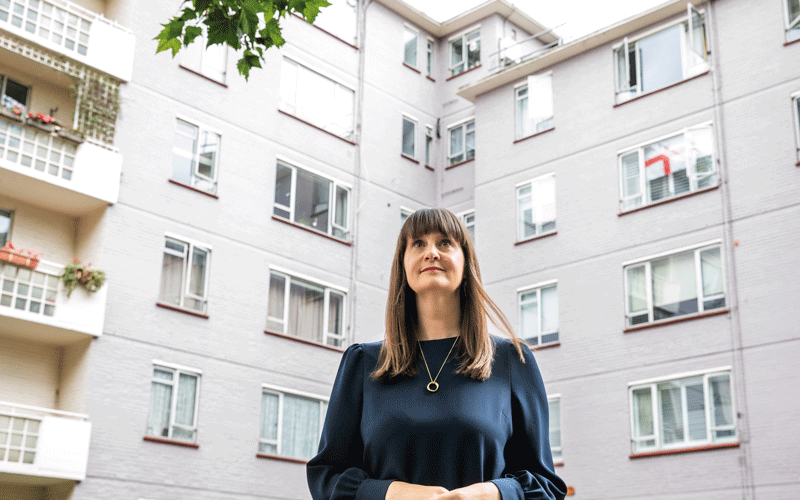
This interview was conducted before the Budget
Few other countries have the same obsession with home ownership as the UK – or the resulting eye-watering prices. But there’s increasing evidence of both a huge financial and human cost, including a generation that has been locked out.
Generation rent
Figures released this summer by the property website Rightmove revealed that, outside London, average advertised monthly rents had reached a record £1,316 – up 7% on last year. In the capital, that figure is £2,652, a rise of 4%.
And that’s at the end of a brutal competition for tenants to actually get a roof over their heads. Research by the New Economics Foundation into the private rental market warns of bidding wars, widespread defects including mould, as well as mid-tenancy rent hikes.
“We learned that four in 10 private renters are paying £1,200 above the advertised rate for their home,” it says.
This is not a minority issue – the English Housing Survey 2021 to 2022 revealed that 2.1 million people own more than one property, with the majority of second homes rented out.
According to Census 2021 data, 62.5% of the population (15.5 million) own their home, falling from 64.3% in 2011.
The government has a fixed interest – last year, it collected £3.8bn in stamp duty.
Social housing has been hit by an increase in demand, central government cuts and the continued sale of stock through Right To Buy. Many housing associations are either run by councils or have elected members on their boards. So the problems have added to local government’s pressures.
But there’s one person who isn’t daunted by all this and believes that change is possible.
Kate Henderson is chief executive of the National Housing Federation, which represents nearly 600 housing associations that, between them, provide homes for six million people.
She’s confident that changing times mean there’s a chance to turn things around.
A new government should help – as well as the demand from councils for financial help to deal with the rising costs of meeting their statutory duty to prevent homelessness. The sector is facing huge demand as private landlords exit their businesses, and as the Home Office places asylum seekers around the country.
Whitehall
Ahead of the party manifestos for the 2024 general election being written, the NHF had discussions with policy teams, and Whitehall officials – especially those covering local government – are well aware of the pressures.
One complaint from campaigners, private providers and social housing alike was the huge turnover of housing ministers – 16 in 13 years – meaning continuity has been lacking.
So, what advice would Henderson give to the new housing minister and the Treasury’s team?
“Solving the housing crisis is one of the biggest and most important challenges for the new government. We shouldn’t under-estimate the scale of the problem” she says. “One in six children lives in over-crowded accommodation. There are more children in temporary accommodation than ever on record. All of them deserve to have safe, affordable housing.”
Henderson is also clear about what is behind the human tragedy, as well as the massive pressures facing those who cannot afford to get on the property ladder.
“This crisis is due to decades of under-investment and short-term, piecemeal housing and planning policies. And there’s been a 60% cut cut in funding for affordable homes since 2010. We need the ability to build, and that means a new approach,” she says.
A critical issue was the introduction in 2015 of a rent cap on housing associations by then chancellor George Osborne, pressuring housing associations to cut costs and speed up home sales. The impact, Henderson says, is still felt today: “Successive rent freezes mean that real-terms income for housing associations is 15% lower than in 2015. This has impacted on the ability of housing associations and councils to build new homes. We’ve seen a 63% cut since 2010 to the affordable homes budget.”
Her members are demanding urgent change: “At the very least, we have to have clarity on future rental income, meaning a long-term rent settlement. These measures will help housing associations rebuild capacity that has been lost, and plan for the future.”
Managing aspirations
The British Social Attitudes survey finds that the majority of people want to own their own home. In some European countries, renting is much more significant. Is a rethink of aspirations needed?
Henderson is clear there needs to be a reality check, given that the UK is not in a position to build enough homes to meet the backlog of demand.
“We would support the aspiration of home ownership. But the reality is that it isn’t going to be possible for everyone. Help to Buy and Right to Buy have increased house prices and rents and caused a net loss of social housing. Given the chronic shortage of housing, we would like to see a priority for social housing,” she says. But this has to be part of a more holistic response from the government.
“We need to see reforms to the private housing sector, such as the end to no-fault eviction. Decent homes standards matter whatever kind of landlord you are, so all residents have access to good-quality houses that are safe. And when things go wrong, people need access to redress.”
One of the objectives set by successive governments has been achieving a decent standard for homes. It’s a huge – and expensive – issue for the public sector, as much of the stock is decades old and needs retro-fitting. That will only get more complex as net-zero targets become more important.
Henderson argues that compliance is still better than among private landlords: “We have a far higher rate of performance: the number of houses that meet the standard is 90%. Of course, we’d like that to be higher. There’s a large amount of work to do.”

Austerity impact
Making changes to the whole system will also mean tackling a skills deficit after years of job cuts – for instance, for trading standards teams, which fight rogue landlords and ‘sheds with beds’ operators.
Can decent homes standards really be achieved across the UK, when there is no real enforcement against the private landlords of houses in multiple occupation? This becomes especially pertinent, given that there are many amateur landlords, with no margins, who are in over their heads.
Henderson says the sector regulator, set up post-Grenfell, is making a difference. But it needs to balance rules with the ability to deliver outcomes. She tells PF: “There’s a huge amount of regulatory change going on – which we absolutely welcome. What’s really needed is for the new government, the regulator and ministers to look at the cumulative impact on housing associations and councils. We all need to make sure that the implementation and cost don’t affect outcomes for residents.”
One issue that didn’t come up during the general election was whether Right to Buy is out of date. The policy was introduced by Margaret Thatcher on the basis that mass private homebuilding, with prices kept low by competition, would fill the need. But the ‘Lawson bust’ at the end of the 1980s put those housebuilders into administration and led to thousands of home repossessions.
As the current generation of first-time buyers weren’t even born then, is it time for a rethink? Henderson says the key is not prioritising private over social housing, as both are needed: “We support people’s aspirations to own their own homes, but that can’t be at the expense of social housing. The biggest issue is that the homes that have been sold should have been replaced. We’re in a time when demand for social housing is growing, so we do think it’s time for a rethink of Right to Buy.”
Pensioned off?
Another factor that accelerated the pressure was the arrival of small-scale investors who, spurred by poor pension returns, became landlords, as that gave them both an asset and an income.
Since 2015, the Treasury has levered in changes to make this a less attractive investment. But should the government consider alternative investment opportunities so people don’t keep buying up houses?
Henderson says it’s an option but that a bigger intervention is needed: “For many years, housing has been seen as a way for generating wealth, as well as being a place to live. There are some policies – like stamp duty and second homes – to discourage this. It’s right that the government looks at all this as part of a long-term plan for housing. But, ultimately, the main issue is supply. Funding policies to help improve that are the best way forward.”

Grenfell Inquiry
But there’s a more immediate – and serious – issue for housing and local government, as well as developers, planners and the construction industry, to face this autumn. The Grenfell Inquiry is due to publish its final report, with serious criticism expected of all involved. Grenfell was run by a tenant management organisation.
The need for change is accepted, but achieving it is hugely complex: “We are absolutely committed to continuing to ensure that the tragic circumstances we saw at Grenfell Tower never happen again,” says Henderson. “Housing associations are working as quickly as possible to carry out remedial work on cladding as part of the implementation of the safety regime for tall buildings. We’re working closely with the government and other stakeholders on this.”
A critical factor, she adds, is cost: “The challenge of funding building safety remedial work is huge – it could cost in excess of £6bn to make all housing association homes meet the correct safety standards. And the funding from the government only covers private buildings. For our members, getting that work done means diverting funding from other valued services and from building new homes. We are keen to have an early engagement with the new government on this issue.”
Despite the complexity and scale of the problems, is Henderson optimistic about getting solutions and the future of social housing?
She is emphatic: “Absolutely, yes. We haven’t had a plan for a long time for how we fund and deliver housing of [any] type, but particularly social housing. There’s a huge opportunity for the new government to set out a bold and confident vision for the kinds of communities we can live in. It will take ambition, the right policy environment and the right funding. But it can be done.”



















